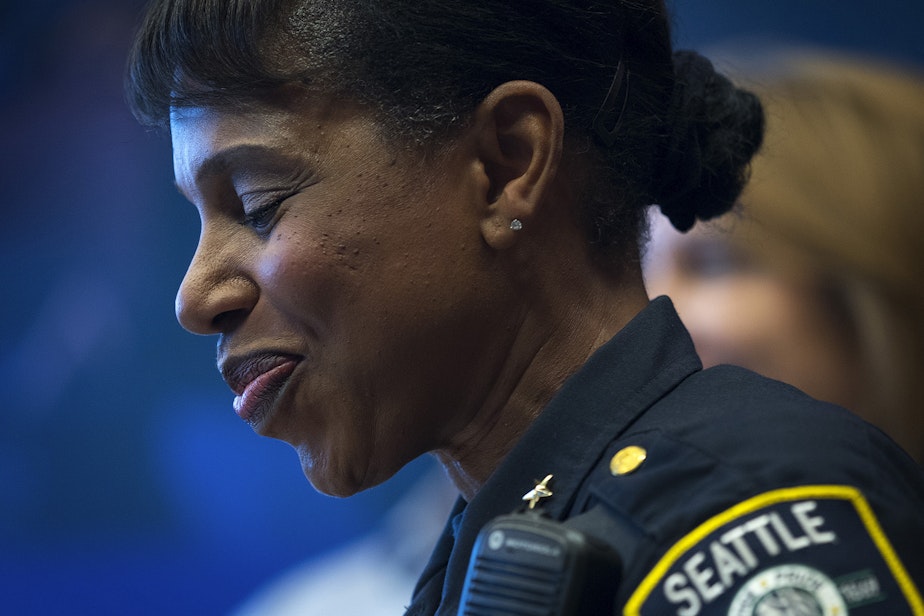Carmen Best on life after Seattle PD: 'I am no longer a police officer. But I’m always a Black woman'

Former Seattle Police Chief Carmen Best was the city’s first Black woman to lead the department. Since she announced her retirement one year ago, she’s been adjusting to life without the badge.
Best’s job with SPD put her in a unique position during the summer of 2020, as people across the country and in Seattle took to the streets to demand racial equity and police accountability.
“I retired from policing. I am no longer a police officer. But I’m always a Black woman,” she says. “I’m always a woman, no matter where I go, no matter what I do.”
So, she understands why people demanded change after George Floyd was murdered at the hands of police in Minneapolis and after Louisville police killed Breonna Taylor in her apartment. And closer to home, after Manuel Ellis was killed by police in Tacoma.
RELATED: Looking back at Seattle's CHOP, one year later
While speaking with KUOW’s Angela King and columnist Joni Balter, Best discussed the community’s concerns about policing and safety and spoke about repairing the fraught relationship between communities of color and police.
“People of color, and Black people specifically, they want to be able to call the police and have the police show up and respond if they get burglarized. But they want to make sure that they’re going to get the same fair and equitable response as everybody else.”
That has been part of the conversation Best has promoted around redefining what policing should look like in Seattle.
“What's driving this [movements like ‘defund the police’]? What are we trying to get to? People don't like the inequities that they're seeing — I can agree with that. So, what are we going to do to move forward?”
“Think about your safety … And if you don’t feel like it’s gotten any better, then you really need to think about that as you go to the polls and cast your vote.”
The future of Seattle
Reacting to their conversation with Best, Balter says she was struck by what the former chief thinks about the city’s future.
Best says Seattle is going in “the wrong direction” with officers leaving the force in droves and with gun violence up from last year. She’s not in a position of power to affect change, but Balter says Best is entering her “second act” in a significant way.
“People who leave a job like chief can still have an impact on the community discussion. And Chief Best clearly wants to have that kind of voice,” Balter says.
In fact, Best used her voice in this conversation to call attention to the November election, when Seattle residents will vote for their new mayor, two citywide Council seats and the new city attorney.
Best emphasized the importance of the latter, in particular.
Former public defender Nicole Thomas-Kennedy is up against attorney Ann Davison in that race. They’re effectively polar opposites. Thomas-Kennedy has pledged not to prosecute most misdemeanors if elected; Davison has said misdemeanors “are crimes that we must be talking about.”
Davison has promised to focus on reentry and diversion programs, which come after someone has come into contact with police; Thomas-Kennedy has said the role of police in Seattle should be dramatically reduced from the start, including for traffic violations and some domestic violence calls.
Best says she would never be so arrogant as to claim she has all the answers. Rebuilding trust in between the community and their police officers is a job for everyone.
“I don’t think people across the board have given up,” she says. “There are folks who continue to drive on every day. That part gives me hope for the future: People will continue to be fully committed. Young people will come forward, and they have been, to be a part of the conversation … to make things better right now but also for the next generation.”
Black in Blue
Best reflects on her experience in law enforcement in a book titled Black in Blue: Lessons on Leadership, Breaking Barriers, and Racial Reconciliation.
The book won’t be available until late October 2021. No spoilers here, but the title gives readers a good idea of what to expect.
Best says writing the book was cathartic, not only for the opportunity to look back on her long career in law enforcement and how the job changed over the years but also to reflect as, a regular person, as much as she can anyway.
“Those issues the community faces and cares about?” she says. “I care about them, too. I carry them with me all the time.”

